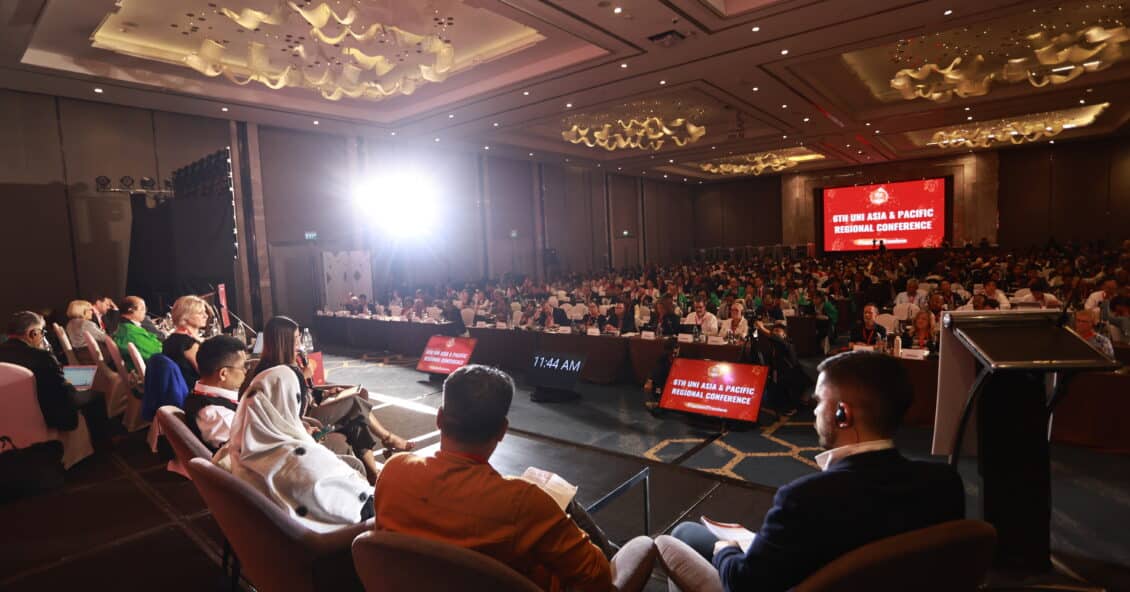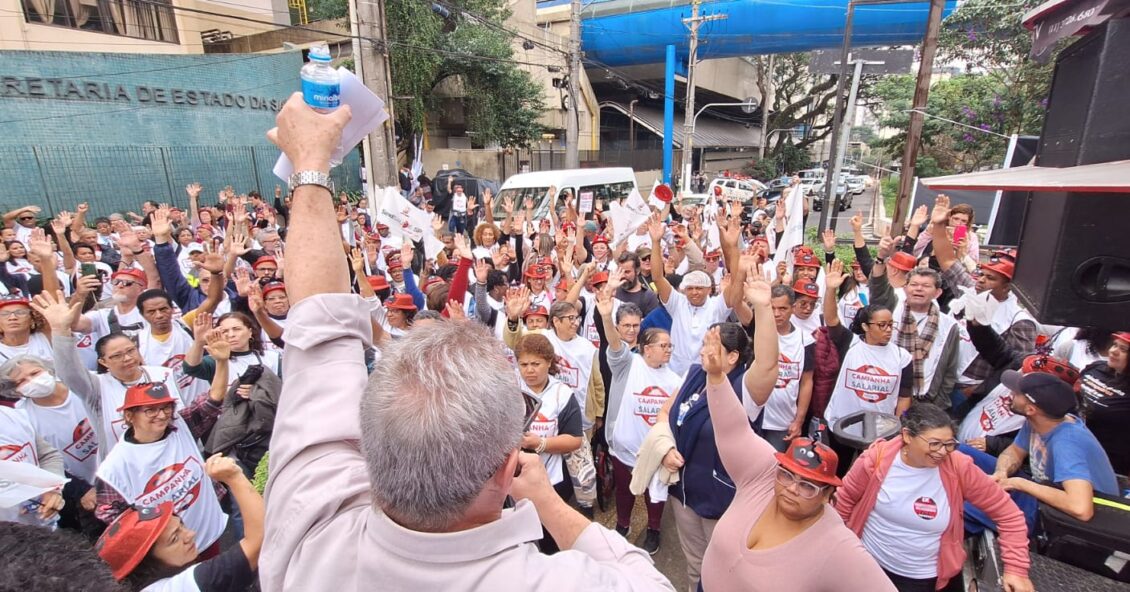Solidarity and organizing key to building worker power in Asia & Pacific
22.11.24
The pressing need for international solidarity in a turbulent world was a recurrent theme on the second day of the UNI Asia & Pacific Regional Conference in Bangkok.
“We are facing the challenges of AI, climate change, and despots and oligarchs who want to make unions disappear. We still face an uphill battle to organize and grow. There are geopolitical tensions which may lead in any direction. That is why we need each other,” said UNI General Secretary, Christy Hoffman, in her keynote address.
“The world will need the determination of the trade union movement more than ever and UNI will be at the heart of it.”
“We don’t just want change – we want transformation. Something much bigger. We must transform our economies. We must transform the role & power of unions. And we must transform unions themselves, so we are more inclusive of young people & women," @CHoffmanUNI #Together2Transform pic.twitter.com/8YAhGqlX16
— UNI Global Union (@uniglobalunion) November 22, 2024
Rajendra Acharya, Regional Secretary for UNI Asia & Pacific, pointed to the many challenges in the region, including the rise of market-driven, pro-business policies fueled by corporate greed which is eroding workers’ rights as multinational corporations wield unprecedented power to undermine labour standards.
Simultaneously, governments influenced by political and economic agendas increasingly restrict the right to organize. The rapid expansion of the gig economy has intensified this issue, with platform and gig workers in sectors like logistics, delivery, and digital commerce facing severe exploitation.
“As the region grows economically, we will fight to ensure it benefits everyone, not just the elites,” vowed Acharya.
✨Celebrating organizing successes at Amazon in 🇮🇳India, health workers in 🇵🇰Pakistan & the 🇵🇭Philippines, and for print & packing workers in 🇹🇭Thailand 💪#Together2Transform pic.twitter.com/cP7oi1rNpO
— UNI Global Union (@uniglobalunion) November 21, 2024
Together to Transform for Union Power
The first half of the conference was dedicated to the many organizing wins in the region and heard from trade union leaders representing healthcare workers in the Philippines and Pakistan, graphical and packaging workers in Thailand, and Amazon workers in India.
Dharmendra Kumar, President, Amazon India Workers Association told participants: “We have had many successes, building a worker association and registering a union despite union busting, stopping amazon from bidding to provide a digital payment system for the state, winning five months’ pay for 800 plus workers who were made redundant when amazon closed a facility to name few.”
In a second panel on union power, Nicole McPherson, National Assistance Secretary Finance Sector Union Australia, explained how organizing has helped her union secure key protections for workers in the face of digital transformation:
“Our union members won industry first entitlements on data security, job protection and worker consultation on AI which will ensure our members control over how AI is used in their workplaces. We did this through worker power – a strong, united group of union members who were committed to winning AI protections and were prepared to take action.”
Together to Transform for Gender Equality and Inclusion
Ayako Nakata from UA Zensen, Japan, newly elected President of the UNI Asia & Pacific Women’s Committee, presented the motion on gender equality and inclusion. She emphasized that gender equality is a fundamental right and critical for societal progress, noting disparities with women earning 23 per cent less than men globally and performing more unpaid care work.
Bhavneet Kaur Alang, UNI Asia & Pacific Women’s Deputy President highlighted the success of UNI’s mentoring programme supported by German trade union confederation DGB. Over the past three years, it has reached over 1,300 women across the region, leading to 631 new union members and 51 women taking leadership roles.
“When we invest in young women’s leadership, we create a robust pipeline of capable leaders who will champion equality in the workplace,” said Bhavneet.
UNI Asia & Pacific Youth Committee Member, Tatsuya Nagafuchi, from ICTJ Japan, spoke of his union’s strategies to reach out to students, after a number of cases of ‘death from overwork’ by young people. “Students don’t have much experience of working so they don’t understand what is unacceptable from employers, and how to leave dangerous work situations,” said Nagafuchi. His union is working with professors to prepare students for work, inform them of their rights and explain the role of trade unions.
Democracy, Human and Trade Union Rights
Yuyun Wahyuningrum from the ASEAN Intergovernmental Commission on Human Rights (AICHR) opened the conference discussion on democracy and human rights.
“Our region, home to vibrant diversity and boundless potential, stands at a critical juncture,” she said. “As the world looks to Asia-Pacific as an engine of global growth, we must ensure that this progress is inclusive and just. Our aspirations must be rooted not in exploitation but in equity, not in exclusion but in empowerment.”
Phil Robertson, Director, Asia Human Rights and Labour Advocates, painted a bleak picture of human rights in the region. He noted that three Asian countries are listed among the “world’s worst countries for workers” under ITUC’s Global Rights Index for 2024. These are Bangladesh, Myanmar and the Philippines.
The day’s discussions repeatedly referred to the dire situation in Myanmar, where there are currently over 20,000 political prisoners, including many trade unionists. Unions have been banned, thousands of civilians have killed and millions of people have fled the country. Robertson urged the global community to support the people of Myanmar:
“UNI and other global union federations should intensify their demands that the ILO invoke article 33 of the ILO Constitution, authorizing member states to impose sanctions and other punitive measures on the SAC military junta for their systematic non-compliance with the Commission of Inquiry,” said Robertson.
However, the oppositional National Unity Government and resistance groups in Myanmar are making progress in some territories. The conference heard from Brother Maung Maung, General Secretary of the CTUM in Myanmar. He thanked UNI’s efforts in supporting workers and democracy in the country, particularly in targeting multinational banks and their investments related to the military regime.
Rajendra Acharya’s address was a strong reminder of the importance of international solidarity in the face of immense challenges in Myanmar and beyond:
“The strength of our unions, our unity and our commitment to justice will guide us as we fight for a better future for all workers in Asia and the Pacific. Thank you for your tireless efforts, your courage, and your unbreakable solidarity. Together, we will continue to progress toward a world of work that is fair, just and equitable for all. Together to Transform!”
Thailand
UNI Asia & Pacific


